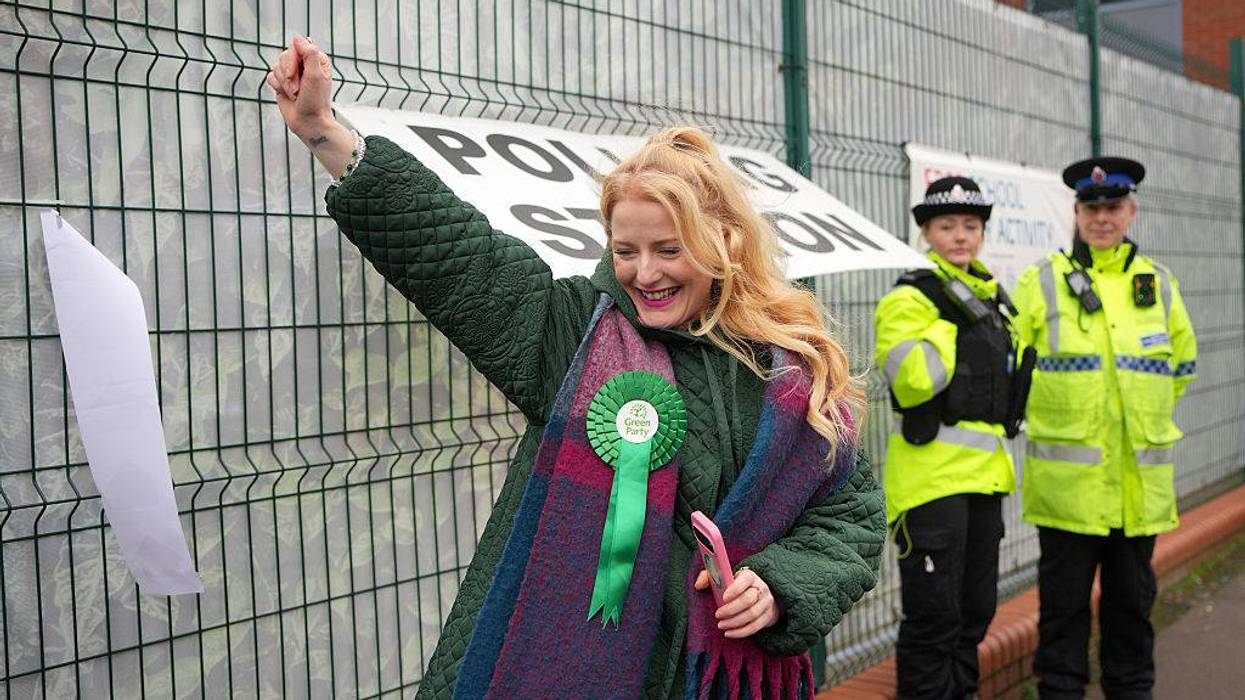May, 04 2015, 02:15pm EDT
For Immediate Release
Contact:
Emma Stieglitz emmaS@berlinrosen.com 646-200-5307
Jack Temple jack.temple@berlinrosen.com 646-200-5280
As McDonald's Announces 'Turnaround Plan' to Boost Flagging Sales, Golden Arches Cooks and Cashiers Vow Largest-Ever Protest at Company's Shareholder Meeting
McDonald's workers announced via video Monday that thousands of cooks and cashiers will travel to Oak Brook later this month to lead the biggest protest ever to hit the company's annual shareholder meeting.
WASHINGTON
McDonald's workers announced via video Monday that thousands of cooks and cashiers will travel to Oak Brook later this month to lead the biggest protest ever to hit the company's annual shareholder meeting.
Armed with 1 million signatures from everyday Americans calling on McDonald's to pay workers $15 an hour and respect their freedom to join together in a union, the cooks and cashiers will hold a series of protests leading up to and during the annual meeting. Fed up with pay that drives them to rely on public assistance to support their families (costing taxpayers more than $1 billion a year) and angry over the company's recent publicity stunt disguised as a wage increase, McDonald's workers will insist that the fast-food giant include in its turnaround plan a serious investment in the cooks and cashiers who make its billions in profits possible.
"We may not have a seat in the room, but we're sure that McDonald's will hear us when we say that its turnaround needs to include investment in and respect for its employees," said Adriana Alvarez, who has worked at McDonald's for five years, but is paid so little that she needs food stamps, child care subsidies and Medicaid to support her three-year-old son, Manny. "I should be able to afford to buy my son the milk he needs to grow up healthy, but that's impossible on what McDonald's pays me."
Alvarez was one of 101 McDonald's workers arrested during a peaceful sit-in at last year's shareholder meeting. The Chicago mom and her McDonald's colleagues will be joined at the protests by clergy from across the country, including the Rev. William Barber II, convener of the Moral Mondays movement and pastor of Greenleaf Christian Church in Goldsboro, NC.
"The fight by fast-food workers for fair pay on the job is a continuation of the moral movement for economic justice that Dr. Martin Luther King Jr. started 50 years ago," said Rev. Dwayne Grant, Pastor at Greater Englewood United Methodist Church in Chicago. "We need to put an end to corporations raking in billions while their employees are forced to skip meals. We are fighting to build a country where people who work hard are paid enough to survive."
In addition to slumping sales, McDonald's approaches its 2015 shareholder meeting facing a host of business challenges at home and abroad.
In the United States, the federal government is accusing the fast-food giant of rampant labor-law violations, and is arguing that the corporate parent, not just franchisees, are responsible for the illegal actions. McDonald's workers in three states filed class action lawsuits alleging wage theft and cooks and cashiers filed a federal civil rights suit alleging rampant racial discrimination at stores in Virginia. Workers also filed more than two-dozen complaints in 19 cities with the Occupational Safety and Health Administration alleging McDonald's workers are being burned on the job, with many told to use condiments like mustard to ease the pain. Meanwhile, scrutiny is increasing on the public cost of the company's low wages.
Overseas, McDonald's is being accused by a coalition of trade unions and the UK-based NGO War on Want of avoiding more than EUR1 billion in taxes over the last five years. The European Commission's Directorate of Competition launched a preliminary investigation to find out whether McDonald's entered into an illegal deal with Luxembourg that allowed it to avoid taxes.
In Brazil, a coalition of trade unions has filed two lawsuits accusing the company of widespread and systematic labor and health and safety violations. One of the suits accuses McDonald's of "social dumping," an anti-competitive practice that drives standards down for workers across the country, and seeks to prevent the company from opening new stores unless it complies with Brazilian law. Also, McDonald's agent in Latin America and the Caribbean, Arcos Dorados, has come under scrutiny in recent weeks, with an investor group asking the New York Stock Exchange to review the company's corporate governance. And in Japan, an investor group is calling on McDonald's Japan to dismiss internal directors and replace them with external ones.
The shareholder meeting comes in the aftermath of the largest-ever strike to hit the fast-food industry--a 236-city walkout in every corner of the United States that included strikes and protests in 40 countries and 100 cities around the globe, from Amsterdam to Zurich.
It's not only workers who feel that they're treated unfairly by McDonald's. A recent survey of McDonald's franchisees by Janney Capital Markets found record-low confidence among Golden Arches franchisees, with the vast majority describing their relationship with the company as "poor." And on Thursday, a poll revealed that a majority of franchisees believe they cannot earn a decent living from their businesses. Franchisees and workers said Thursday that they would work together nationwide to reform the $800 billion franchising sector and bring balance back into the industry.
LATEST NEWS
Green Party Scores Upset Win in UK Election in Blow to Labour, Far-Right Reform
"Instead of working for a nice life, we’re working to line the pockets of billionaires," victorious Green Party candidate Hannah Spencer said during her victory speech. "We’re being bled dry."
Feb 27, 2026
Green Party candidate Hannah Spencer on Thursday won an upset victory in a byelection in the Gorton and Denton constituency, delivering a blow to both Labour Prime Minister Keir Starmer and the far-right Reform Party led by Nigel Farage.
As reported by the Guardian, Spencer, a local plumber, won by overturning a 13,000-vote majority that the Labour Party achieved in the 2024 general election.
In fact, Labour fell to third place in the Thursday election, winning 9,364 votes, compared to 14,980 votes for the Greens and 10,578 votes for Reform.
In her victory speech, Spencer emphasized major class divides in the UK, where she said people are working increasingly harder for fewer benefits.
"Working hard used to get you something," she said. "It got you a house. A nice life. Holidays. It got you somewhere. But now—working hard? What does that get you?... Instead of working for a nice life, we’re working to line the pockets of billionaires. We’re being bled dry."
The Green Party said Spencer's victory showed it was now a viable force in national elections, projecting that it is "on track to win over a hundred seats at the next general election, if the historic swing achieved to win Gorton and Denton is replicated nationwide."
Green Party leader Zack Polanski hailed the election result and predicted "a tidal wave of new Green MPs" in future elections should current trends continue.
"When I was elected Leader of the Greens I said we were here to replace Labour and I meant it," Polanski said. "Hannah was a fantastic candidate and I know she’ll make a brilliant MP."
Starmer, who has pushed the Labour Party to the right on issues such as immigration and transgender rights during his tenure, reacted bitterly to the defeat in a letter he sent to other Labour MPs.
"The result in Gorton and Denton is deeply disappointing," Starmer wrote. "Instead of a Labour MP who can be a local champion delivering for Gorton and Denton alongside a Labour Government and a Labour mayor, the people of Gorton and Denton now have a representative who is more interested in dividing people than uniting them."
Starmer, whose job approval rating in polls is consistently under 20%, also predicted that "over the coming months, people will feel the benefit of the long-term decisions this government is taking."
Socialist commentator Owen Jones, a longtime Starmer critic, gloated over the result in a social media post in which he reminded followers of Starmer's past statement that left-wing voters could "leave" if they didn't like the changes he was making to Labour.
"OK, Keir Starmer, we did as you asked us!" he wrote. "Happy now?"
Keep ReadingShow Less
For First Time, Gallup Poll Shows Americans Sympathize More With Palestinians Than With Israelis
"It is difficult to overstate the significance of this," said one analyst. "This is a key reason why Israel—and its supporters in the US—have a sense of desperate urgency when it comes to war with Iran and annexation of Palestine."
Feb 27, 2026
A Gallup survey released Friday found that a larger percentage of Americans sympathize with the Palestinians than with the Israelis in the decades-long Middle East conflict, which has exploded over the past two and a half years with the Hamas-led attack on Israel and the latter's genocidal response—fueled by military and diplomatic support from the US government.
The new poll marks the first time since Gallup began tracking the question in 2001 that a larger portion of respondents (41%) expressed sympathy for the Palestinians than the Israelis (36%) "in the Middle East situation." The organization noted that while "the five-percentage-point difference is not statistically significant," it "contrasts with a clear lead for the Israelis only a year ago (46% vs. 33%) and larger leads over the prior 24 years."
"From 2001 to 2025, Israelis consistently held double-digit leads in Americans’ Middle East sympathies, with the gap averaging 43 points between 2001 and 2018," Gallup reported. "However, public opinion began narrowing in 2019, several years before the Oct. 7, 2023, Hamas attack on Israel and the subsequent war in Gaza. The cumulative effect of gradual changes in US attitudes since then has led to the Israelis no longer being viewed more sympathetically."

Notably, the Gallup survey shows that "Americans of all age groups have grown more sympathetic to the Palestinians in recent years." A majority of Americans between the ages of 18 and 34 (53%) said they sympathize more with the Palestinians and 23% said they sympathize more with the Israelis, "a record low for the age group," according to Gallup.
The survey also showed a "near reversal" among Americans aged 35 to 54—with 46% now saying they sympathize more with the Palestinians—and the "narrowest gap in sympathies" Gallup has ever recorded for Americans aged 55 and older.
In terms of political affiliation, Gallup found that "Americans’ shifting sympathies in the Middle East situation this year are mostly driven by changes among political independents," who now sympathize more with the Palestinians than the Israelis by a margin of 41% to 30%.
"It is difficult to overstate the significance of this," Trita Parsi, executive vice president of the Quincy Institute for Responsible Statecraft, wrote in response to the Gallup survey. "This is a key reason why Israel—and its supporters in the US—have a sense of desperate urgency when it comes to war with Iran and annexation of Palestine."
"The window for these aggressions with US support is closing," Parsi added.
The new poll also found that Americans' support for a Palestinian state is at its highest level in more than two decades as current Israeli leaders vow to prevent Palestinian statehood and ramp up their illegal annexation of territory—an effort effectively endorsed by the Trump administration.
Keep ReadingShow Less
Hundreds Reportedly Killed as 'Open War' Breaks Out Between Pakistan and Afghanistan
A spokesperson for the head of the United Nations implored both sides to "seek to resolve any differences through diplomacy."
Feb 27, 2026
This is a developing story... Please check back for updates...
Pakistan's defense minister said Friday that his country and Afghanistan are in an "open war" after Afghan forces attacked Pakistani border troops in what Kabul characterized as retaliation for recent airstrikes.
Pakistan, which has nuclear weapons, responded to the attack on its border troops with airstrikes on at least three Afghan provinces early Friday, reportedly killing more than 220 people. A spokesperson for Afghanistan's Taliban government said its forces killed dozens of Pakistanis in Thursday's onslaught.
Al Jazeera’s Kamal Hyder, reporting from Pakistan on Friday, said that "we were able to see and hear outgoing fire from the Pakistani side that appears to be heavy artillery, which means that the clashes are still continuing."
Stéphane Dujarric, a spokesperson for United Nations Secretary-General António Guterres, said the UN chief is alarmed by the escalating hostilities and urged the "parties to continue to seek to resolve any differences through diplomacy."
Keep ReadingShow Less
Most Popular


